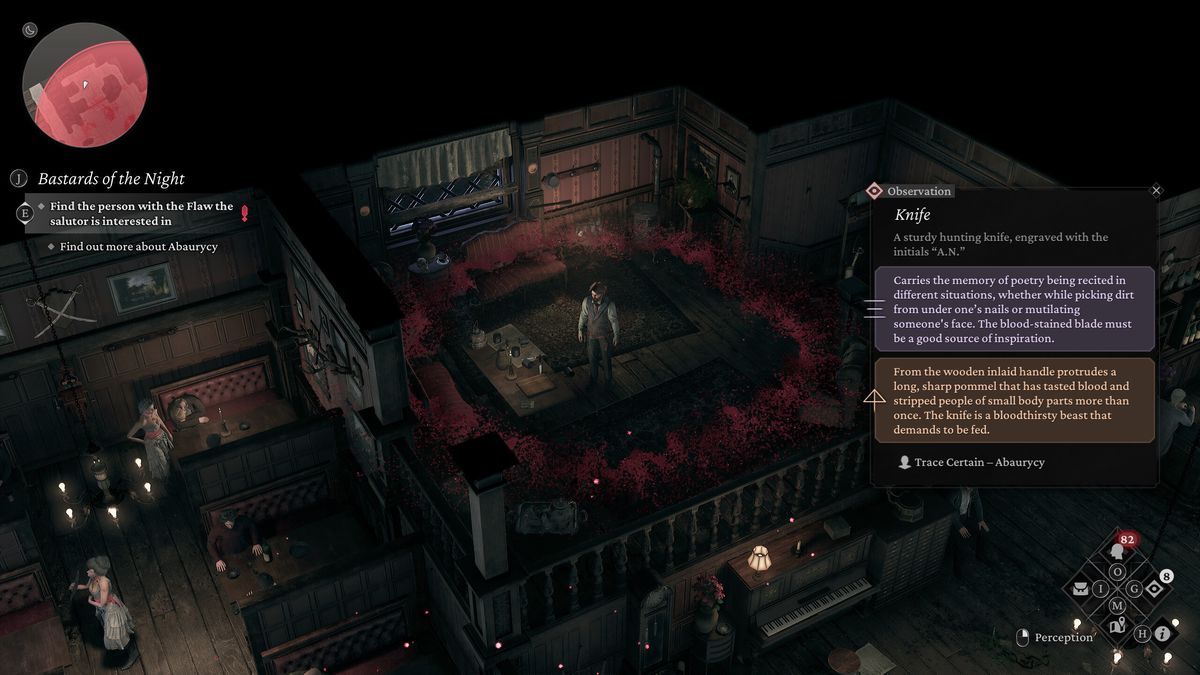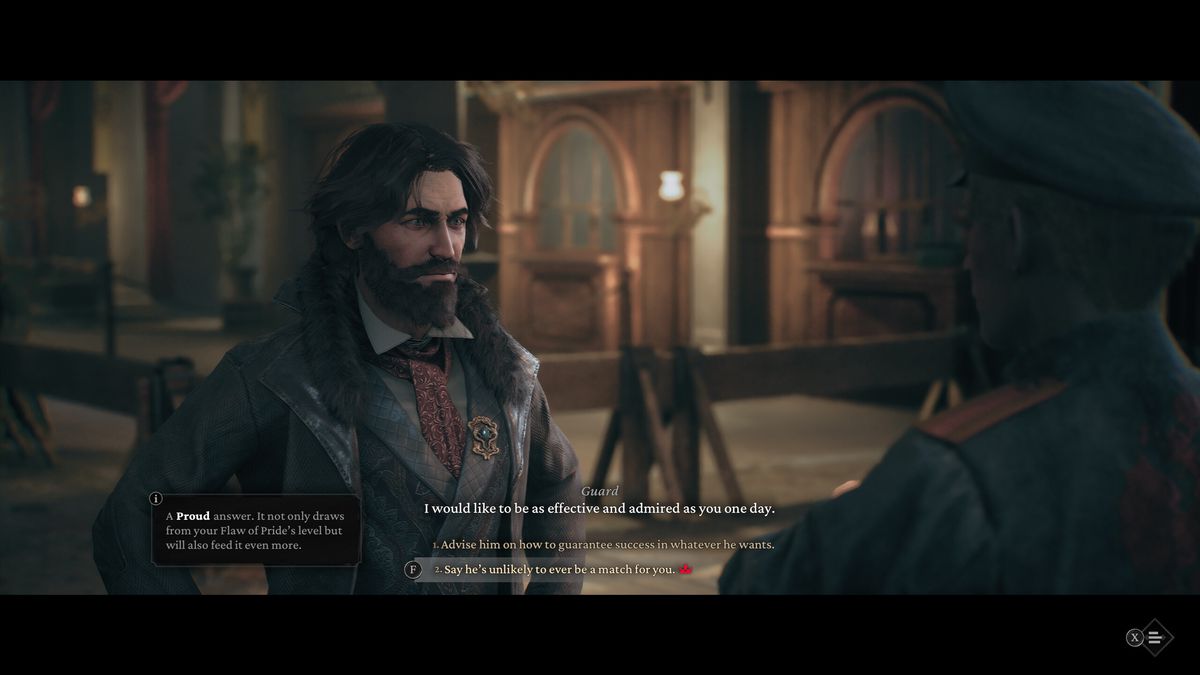The Thaumaturge is ambitious, compelling and a bit janky
The Thaumaturge exists in an alternate 1905 Warsaw, where I can’t go anywhere without some soldiers trying to rob me for my nice warm boots, and to make matters worse, I play an exhausted-looking man who keeps talking to himself. This RPG world doesn’t have the same immediate appeal as a fantasy realm Baldur’s Gate 3‘s Faerun, but once I start digging I find a wealth of great writing and compelling choices.
The game starts with a short tutorial in which we are introduced to Wiktor Szulski, our proud protagonist. Wiktor is a Thaumaturge, a mage who calls upon ancient rituals to bind spectral entities and cryptids known as salutors to his will. He’s also a bit of an asshole; the only people he is even close to are his beloved sister and his new friend Rasputin. (Yes, That Rasputin.) While the tutorial is set in a small village, allowing the player to discover Wiktor’s abilities in a low-pressure environment, I’ll soon be heading to Warsaw to investigate a much higher-stakes mystery.
When a game throws a bunch of proper nouns and mechanics at me, there’s always the risk that I’ll miss something. Fortunately, Fool’s Theory, the developer of The Thaumaturge, does a good job of introducing concepts naturally. This is the kind of game I could rush through in a few long sessions, always wanting to talk to one more person, draw one more conclusion, solve one more quest.
Image: Fool’s Theory/11 bit studios
Using Wiktor’s Thaumaturge powers is a big part of the game. Certain items leave a trail, a marker of the owner and a great way to find evidence throughout the story. For example, during the tutorial I found a year-old blood stain smeared on a scorched floor. Just looking at it is enough to tell me how the person died, the murder weapon, and their emotional state at the time. It’s important that I follow up on these mysteries too, because in this universe, bad feelings are more than just an unpleasant experience: they’re downright deadly. Major moral failings provoke salutators, who then threaten the population.
The best comparison I can draw here is with the Witcher universe, another paranormal Polish franchise. Both depict everyday life, with people concerned about ‘normal’ things like war, the economy and their families, but they also live side by side with monsters and magic. At some point I have to solve the mystery of why everyone in an inn has gone murderously mad. Sure enough, after a little digging I find an evil phantom. Geralt and Wiktor can probably get drinks and talk about monster hunting.
In this universe, Thaumaturges must bind one salutor to their will to keep them grounded. However, Wiktor is slightly more ambitious than the average Thaumaturge; like a feral Ash Ketchum, he wants to catch them all. I ended up owning half a dozen of them, and they are visually striking. I’ll start with the Upyr, a demonic creature from Slavic mythology that looks like a floating skeleton wrapped in heavy furs and that drains an enemy’s health and heals Wiktor. My enemies can’t see him, but I get a kick out of seeing him hover behind my enemies with his pitted sword.
Here’s where The Thaumaturge Opens up more like a traditional RPG, with a combat style reminiscent of the Yakuza games. Wiktor starts fighting with his fists, and I can choose between a quick attack or slower but more powerful hits. As I bind more salutors to my will, I can use them in battle. The Lelek is a weird little bird that causes madness and chaos to my opponents, while the Bukavac is a large chained bone beast that deals massive damage to my enemies.

Image: Fool’s Theory/11 bit studios
But even though Wiktor is a Thaumaturge, he can’t solve every problem with magic or salutors. He must also serve as a detective. When I find all the evidence I need, I can draw conclusions that open up new possibilities for conversation. I can blunder through situations with blunt force, but if I want the cleanest possible solution, I have to look around me. Certain discoveries are locked behind Thaumaturge schools, which I can only unlock by leveling up. There are always choices to be made, and most of them have a downside.
This is especially true when it comes to Wiktor himself. He has a ‘flaw’, a flaw so great that he runs the risk of attracting salutes and causing all kinds of trouble. He struggles with pride, so I get a lot of conversation options marked with the little pride symbol. A lady asks me to kneel and tie her shoe so she can secretly have a private conversation? I can do that like a gentleman, or I can scold her for treating me like a lackey. Wiktor is very aware of his pride, and he discovers that other people have similar flaws: anger, greed, and so on. All this can lead to discontent, violence and the arrival of more salutators to mess with the innocent population.
The more I give in to my sin of pride, the more conversation opportunities open up along the way. It’s a balancing act between not wanting to be a doormat and not wanting to completely lose Wiktor to his curse. It is especially difficult to be a kind and patient person in Warsaw.
The city itself has a flourishing character, a place of contrasts and conflicts. There are flyers on the streets encouraging workers to join unions and organize for a nine-hour workday, alongside warnings of evil Thaumaturges that must be exterminated or they will bring devils and despair with them. The city is in the hands of the Russian Tsar, but consists of different people. Jewish merchants trade with Polish townspeople who resist the Russian soldiers looking over their shoulders. A seedy underbelly of crime flourishes as the city’s wealthy enjoy ballrooms and banquets. Wiktor is an outsider in Warsaw who views the city with disdain. The city, in turn, treats him with suspicion.

Image: Fool’s Theory/11 bit studios
The game even opens with an acknowledgment of the real-world issues it tackles with its storytelling. There is:
Fool’s Theory is a team of people with different beliefs, religions, sexual orientations and gender identities. Our goal is to tell mature stories that are intended to be a source of reflection for players. We would like to point out that in creating a game that draws so much inspiration from the past, we could not omit the representation of certain attitudes and positions that are rightly considered unacceptable today.
There are times when this writing philosophy is jarring; Upon arrival in Warsaw I am immediately greeted by an agent of the Tsar who rants about the enemies of the state. It’s an ugly sentiment, but one that feels real and rooted in history, and it immediately motivated me to look beyond Wiktor’s selfish concerns and start helping people under the Tsar’s evil rule.
However, there is the matter of Jank, which is to be expected from an ambitious game from a smaller studio. At one point, all my save files were corrupted by an update, which was a bit annoying. I even had to restart the game a few times due to memory issues. On a smaller scale, certain cutscenes feel a bit rushed and inaccurate, with characters cutting through terrain or suffering from awkward animations. It’s never enough to ruin the atmosphere, but it can be annoying from time to time.
That being said, The Thaumaturge manages to do a deft job between the supernatural story and the context of the historical setting. Wiktor is an outsider and his distance from society allows him to choose a side. I chose to have him support the unions and be a true comrade, but the game has numerous ramifications – including some where he becomes proud or commits sins he cannot erase. These are the choices that are made The Thaumaturge worth it, even if I’m annoyed by the technical shortcomings. Wiktor’s powers, detective skills, pride, and values are all things that can change the decisions before us, and when I make a choice, it feels heavy. Since this is an RPG that’s about 25 hours long, I’m already getting excited to see how a second run changes things up. However, I feel that no matter how hard I try, something is going to go terribly wrong someone.
The Thaumaturge was released on March 4 on PlayStation 5, Windows PC, and Xbox Series X. The game was reviewed on Windows PC using a pre-release download code provided by 11-bit studios. Vox Media has affiliate partnerships. These do not influence editorial content, although Vox Media may earn commissions on products purchased through affiliate links. You can find Additional information about Polygon’s ethics policy can be found here.
